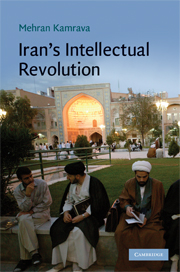Book contents
- Frontmatter
- Contents
- List of tables
- Acknowledgments
- 1 Introduction
- 2 Emerging Iranian discourses
- 3 Theorizing about the world
- 4 The conservative religious discourse
- 5 The reformist religious discourse
- 6 The secular-modernist discourse
- 7 Iran's silent revolution
- Bibliography
- Index
- Cambridge Middle East Studies 29
5 - The reformist religious discourse
Published online by Cambridge University Press: 06 July 2010
- Frontmatter
- Contents
- List of tables
- Acknowledgments
- 1 Introduction
- 2 Emerging Iranian discourses
- 3 Theorizing about the world
- 4 The conservative religious discourse
- 5 The reformist religious discourse
- 6 The secular-modernist discourse
- 7 Iran's silent revolution
- Bibliography
- Index
- Cambridge Middle East Studies 29
Summary
Efforts aimed at “reforming” Islam go back to the earliest days of the religion relatively soon after the passing of Prophet Muhammad, and especially after Islam's political institutionalization by the Ummayids. Islamic history is replete with examples of reformist movements of one sort or another, the pace and intensity of which increased beginning in the eighteenth and nineteenth centuries as Muslims came into increasing, unequal, and often acrimonious contact with the West. In Iran, efforts aimed at religious renewal and the articulation of more modernist fiqhs picked up pace at around the same time also, especially near the end of the nineteenth century, when jurists such as Ayatollahs Mohammad Hosein Na'ini and Mohammad Kazem Khorasani endorsed such political novelties as democratic government, elections, and parliaments during the Constitutional Revolution of 1905–11. Twentiethcentury Iran saw no shortage of such efforts, pioneered by the likes of Mehdi Bazargan, Ali Shariati, and Ayatollahs Morteza Mottahari and Mahmood Taleqani, culminating in the Islamic revolution of 1978–79.
By the time the late 1980s and the 1990s came around, therefore, what had come to be commonly known as “Islamic reformism” had had a long and influential history in both Iranian religious tradition and the popular imagination. This time, however, religious reformism was being articulated within the contexts of, and often in opposition to, a theocratic political system, one in which Islam informed the official ideology of the state. Just as importantly, as the last chapter showed, under the Islamic Republic, many religious actors within the state and their societal allies have articulated and politically supported traditionalist interpretations of fiqh that now form the basis of a conservative religious discourse.
- Type
- Chapter
- Information
- Iran's Intellectual Revolution , pp. 120 - 172Publisher: Cambridge University PressPrint publication year: 2008

